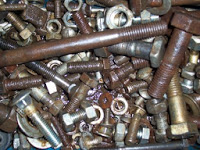Well, duh !
 |
| The path were on… Photo by Greenpeace |
Canadian Press Columnist Thomas Walkom, last Friday, penned an interesting column that certainly would identify a strong motive why there is such a “shortage” of “skilled labour” in Canada. It feels like Canada follows the same path as did the US, only about 10-20 years later – don’t it? Don’t those white old men in Ottawa, or wherever the decision are made, have any originality in their plans?
As far as the Canadian marine industry is concerned, I suspect these “puppet masters” overestimate the availability of trained and competent ship’s engineers on the world market – willing to come to Canada and enjoy our low income tax rates, and affordable cost of living. But it is plain to see that in Canada, the theory proposed by Mr. Walkom, and more, as to be the end game, and it has been forming for some time.
The Canadian maritime workforce is a already a fractured one easily dominated. The extreme need of an individual immigrant seafarer to “succeed”, possibly supporting a family, and gambling it all for a perceived better place to live, is a very strong motivator. The move to Canada, and all the immigration headaches need to be worthwhile.
I would suggest that this means that the newly minted Canadian seafarers will extend themselves more, for less – presenting a net bottom line benefit to the ship owner. Thus the validity of Mr Walkom’s argument, and one that I share. This need to adapt has certainly hit the marine workforce, by suppressing
wages, and essentially exacerbating the shortage situation. This is not a sustainable pace for a newcomer to Canada to maintain, and eventually there will be a need to reconcile the individual immigrant’s hardships with some form of benefit for their family unit.
After this pool of “immigrants” runs out, the only other option is to remove the immigration hassles altogether, by not having any “Canadian” nationals manning ships trading between Canadian ports. Another words, the removal of Canadian cabotage rules, which I predict to occur within ten years or so. Ironically, this is what the US is going through right now, with numerous calls to remove the Jones Act, their cabotage regulations, and a long list of actions to water down its effectiveness.
If companies knew they couldn’t import, say, skilled pipefitters from
Europe, they might put more effort into training domestic workers to
meet their needs.But employers know they don’t have to train.
Instead, they need only wait until the last minute and then complain of
labour shortages.Over the last decade, as my friends at the
Globe and Mail have reported, the number of temporary workers admitted
to Canada has more than tripled, from 101,000 to 338,000.This in the midst of the worst recession since the 1930s.
You can read Thomas Walkom’s entire article here.
In my experience there is a real shortage of marine engineers, especially those with high tickets, lots of experience, willing to work months on end, on subsistence wages: yup, there is a real shortage of those people.
Paul Krugman of the New York Times, on his blog, quips this in a comment about this piece from Adam Davison.
Whenever you see some business person quoted complaining about how he or
she can’t find workers with the necessary skills, ask what wage they’re
offering. Almost always, it turns out that what said business person
really wants is highly (and expensively) educated workers at a
manual-labor wage. No wonder they come up short.
Here’s another business savy way to make more money you “good with numbers” smart people, take notes.
Oh that precious godly money…
 |
| The job market of the now. Graphic by the New York Times |



